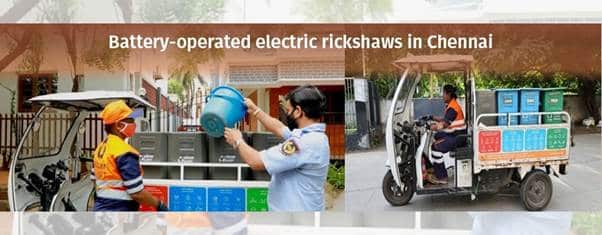The integration of electric vehicles (EVs) into household waste collection

In a significant move towards a cleaner and greener India, several cities are integrating electric vehicles (EVs) into their waste collection systems as part of the Swachh Bharat Mission-Urban (SBM-U). This initiative aims to reduce air and noise pollution while enhancing urban sanitation. By replacing traditional diesel-powered garbage trucks with zero-emission vehicles, cities are not only cutting carbon emissions but also working towards the goal of Garbage Free Cities. This innovative approach combines clean mobility with effective waste management, setting a precedent for sustainable urban living.
Guntur’s Eco-Friendly Waste Management
Guntur, located in Andhra Pradesh, is leading the charge in eco-friendly waste management by deploying over 200 electric autos for door-to-door garbage collection. This initiative is supported by the United Nations Industrial Development Organization (UNIDO) and the Global Environment Facility (GEF) through the Sustainable Cities Integrated Pilot Approach (SCIAP). The shift from conventional diesel-powered trucks to electric autos is a significant step towards sustainability. Each electric auto is equipped with GPS tracking, allowing for real-time monitoring as they cover the city’s 159.46 square kilometers.
The project is expected to eliminate the need for over 71,000 liters of diesel annually, resulting in a reduction of approximately 21,000 tonnes of greenhouse gas emissions over the next decade. This transition not only helps combat climate change but also improves air quality in the region. Additionally, electric vehicles have lower maintenance costs and a longer operational lifespan compared to traditional garbage trucks, making them a cost-effective solution for municipal waste management. The initiative also creates job opportunities and enhances service reliability, contributing to the overall sustainability of urban environments.
Chennai’s Battery-Operated E-Rickshaws
The Greater Chennai Corporation (GCC) has introduced battery-operated electric rickshaws for waste collection throughout the city. This initiative aligns with the vision of eco-friendly development while addressing urban challenges such as air and noise pollution. By replacing diesel-powered vehicles with E-rickshaws, which travel approximately 40 kilometers daily, Chennai is reducing around 41 tons of carbon emissions each day, leading to an annual reduction of 15,160 tons.
These electric rickshaws are specifically designed for door-to-door waste collection from households, commercial spaces, and non-residential areas. They come equipped with separate bins for wet, dry, and hazardous waste, promoting source-level segregation and encouraging environmentally conscious practices among residents. Currently, the GCC operates a fleet of 5,478 E-rickshaws, servicing all 15 zones and covering 24,621 streets, reaching over 2.1 million households. This comprehensive system not only provides significant environmental benefits through zero emissions but also reduces reliance on fossil fuels and lowers operational costs. Furthermore, the initiative has created employment for over 6,000 individuals, and the integration of audio systems in the E-rickshaws helps raise awareness about waste segregation.
Indore’s Transition to Electric Vehicles
Indore Municipal Corporation is making strides in environmental sustainability by introducing 100 electric vehicles for door-to-door waste collection, replacing traditional diesel-powered trucks. This initiative focuses on key city areas like Rajwada and is projected to reduce annual carbon emissions by approximately 24,918 tons. The transition to electric vehicles is expected to significantly lower fuel and maintenance costs for the corporation.
Equipped with real-time GPS tracking through the Integrated Command and Control Center (ICCC), these electric vehicles will enhance service transparency and monitoring. The switch from diesel vehicles is anticipated to save the corporation around ₹5.97 crore annually, considering expenses related to fuel, servicing, engine oil, and clutch replacements. To support this green fleet, the corporation has established 20 solar charging stations, each with 10 kW solar panels capable of generating 800–1000 units of green energy daily. These stations can charge 80 to 100 vehicles per day, significantly reducing dependence on conventional electricity sources.
A Collective Shift Towards Sustainability
The initiatives undertaken by cities like Guntur, Chennai, and Indore exemplify a powerful shift towards cleaner and more sustainable urban waste management under the Swachh Bharat Mission-Urban. By embracing electric mobility, renewable energy, and digital technologies, these cities are not only mitigating environmental impacts but also improving operational efficiency and enhancing community well-being. The integration of electric vehicles into waste management systems represents a crucial step in the ongoing effort to create a greener and more sustainable future for urban India.
Observer Voice is the one stop site for National, International news, Sports, Editor’s Choice, Art/culture contents, Quotes and much more. We also cover historical contents. Historical contents includes World History, Indian History, and what happened today. The website also covers Entertainment across the India and World.

